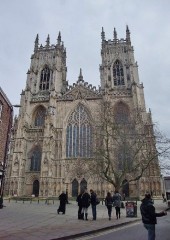Hannah Baxter has spent just over a year working as intern to Dr. Jon Kenny. She has recently become a full time member of staff at York Archaeological Trust. This e-mail interview, about her time working at Hungate, was conducted by Post Hole Co-Editor Mark Simpson in May 2012.
Mark simpson - Can we start with a little background on you and how you came to be working at York Archaeological Trust?
Hannah Baxter - I finished university (from Durham then Sheffield) in 2008 and then enjoyed a few years of digging. During this time I volunteered on a community excavation in Sheffield and worked on another in Kent. I very much enjoyed this and, as a result, emailed the CBA asking how I could become a community archaeologist. This may sound a ridiculous thing to do, but it worked as they told me about the Community Archaeology Training Placements coming up the following year. I applied to the placement at YAT and here I am! (See http://www.britarch.ac.uk/community/bursaries if you think you may be interested in a placement in 2013-14).
MS - Had you heard of the Hungate site before coming to York?
HB - I tried to find it once on an open day during the Viking festival but completely failed and ended up on Fossgate - I enjoyed the shops down there though! Luckily I then got to go on a site tour during a CBA conference on Archaeology and Education in 2008.
MS - How do you feel Hungate has contributed to archaeology in York?
HB - I think it is easy to think of York as being all about the Romans and Vikings, particularly the Vikings. I think Hungate has made people more aware that the Romans and Vikings (lovely as they are) are not all there is to York and definitely not all there is to archaeology. Excavating the 19th century streets has shown the public that relatively recent archaeology is interesting too, and I think Hungate has really demonstrated that archaeology is about people, not things. I am absolutely gutted I missed this stage of the excavation!
MS - You have worked a lot at Hungate, how does it compare to other sites you have worked on?
HB - It is very different. Mostly I have worked on rural sites, large open areas with lots of ditches and pits to put slots through and section. So to be on a site with deep stratigraphy is a little bewildering. I have had to learn new ways of recording things.
It is also different in that the finds specialists and the animal bones specialist are not locked away somewhere but handily around to annoy with lots of questions.
And there appears to be very little grumbling, which is extremely strange for archaeologists.
MS - What is your favourite find from Hungate?
HB - Can I have more than one? And it will not be anything I found as I am probably the only person to have worked on Hungate and found zilch!
Firstly, I very much like the green glazed pot with a deer type creature on it; it looks just like an antelope. I love how the antelope looks as though he is dancing; he looks so free and also very graceful and elegant. I like thinking about the person who made it, perhaps he has just seen a picture of an antelope but he has big dreams to travel and see all sorts of strange animals.
Secondly, whilst digging one day with a volunteer, she found some strange looking stuff and we had to ask Pam what it was. It was poo! Of course I was very excited that there was poo in our pit.
And thirdly, (as I think a site with so many finds as Hungate can have at least three favourite finds), the child burial that was discovered in a lead coffin with jet jewellery. I am disinclined to think of a skeleton as a find, a person is not an object, but I have been so moved by this one that I want to write about it. My only previous experience of Roman child burials was a probable exposure site, where unwanted babies are left out in the open to die, so I am afraid I have thought of the Romans as a horribly uncaring brutal bunch. But this little girl was beautifully buried in a way whoever buried her believed would protect her, she was so obviously loved.
MS - Do you feel that working at Hungate has boosted your archaeological CV?
HB - Ooh what a serious question! As I have said above, mostly I have worked on rural sites so having experience of an urban site has certainly been useful. I also think it is good to work in as many places, on as many sites, over as many different periods and for as many different people as you can. Not just to learn about the archaeology itself but also to learn different ways of excavating and recording sites — to know how archaeology operates commercially. As a (baby!) community archaeologist it has been wonderful to work with the volunteers. I have learnt much, much more from them than they have learnt from me both about community work and the site. So yes I think it has.
MS - What was the best thing about working at Hungate?
HB - I have thoroughly enjoyed taking part in an excavation that feels incredibly special, not just because of the amazing archaeology, but also because of the lovely people (both staff and volunteers) that work there. The absolute best thing has been working with the volunteers who have a very good knowledge of the site and whose enthusiasm knows no bounds, even turning up in pouring rain and still willing to go out on site.
MS - What are your favourite memories of working on site?
HB - Lots of chatting and mattocking with the volunteers. With this in mind it is a good thing that I found zilch, no one wants to find treasure with a mattock!




